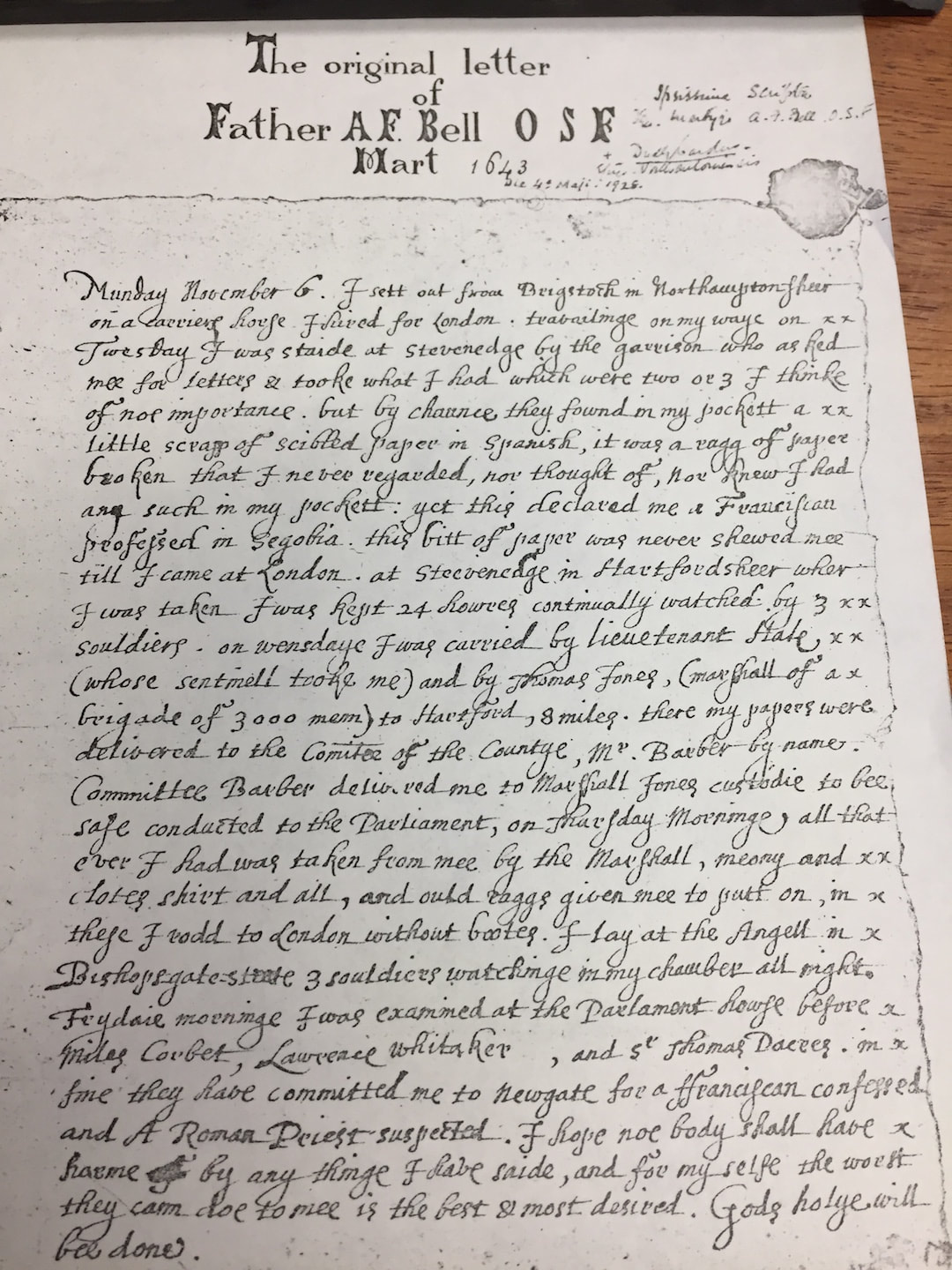When Maria Bell was received into the Monastery on 2nd July, 1711, she brought with her to the Monastery the ‘precious relic’ of the last letter, by Fr Francis Bell, a relative, giving an account of his arrest. This is a photocopy taken by the nuns some years ago - the original is rather fragile.
He was born on 13th August, 1590 in Temple Broughton, Worcester. He completed his schooling at the Jesuit college in St Omer, after which he entered the English College in Valladolid, where he was ordained a priest aged about twenty-eight, and about a year later took vows as a Franciscan. He was then sent to the newly established English Convent in Douay in order to continue his studies. Over the next ten years he was Confessor to the Poor Clares of Gravelines near the Belgian border, then to the third order Franciscan nuns in Brussels, and Superior of the Douay Convent, while also becoming a professor of Hebrew. He arrived home in England to serve the English Mission on 8th September, 1634 and working here for nine years, making many converts. He was arrested on 6th November, 1643 at Stevenage, initially on suspicion of being a spy; but upon being searched, hand written copies of the Office of the Blessed Sacrament and a formula for blessing the cord worn by members of the Confraternity of St Francis were found in his possession – evidence that he was a Catholic priest. Three witnesses testified against him, all apostate Catholics, one of whom had abandoned religious vows. After a short deliberation the jury pronounced him guilty, and the death sentence pronounced, at which Fr Francis joyfully intoned the Te Deum and heartily thanked the court. During the next three days he remained in prison where he was visited by many Catholics, and where he wrote his account. On 11th December 1643, Fr Francis was hanged for the space of one Miserere, cut down alive, dismembered, disembowelled and quartered. In stripping him, he was found to be wearing his Franciscan habit under his secular coat. He was aged 53, in the 25th year of his religious profession and his ninth in the English mission.
He was born on 13th August, 1590 in Temple Broughton, Worcester. He completed his schooling at the Jesuit college in St Omer, after which he entered the English College in Valladolid, where he was ordained a priest aged about twenty-eight, and about a year later took vows as a Franciscan. He was then sent to the newly established English Convent in Douay in order to continue his studies. Over the next ten years he was Confessor to the Poor Clares of Gravelines near the Belgian border, then to the third order Franciscan nuns in Brussels, and Superior of the Douay Convent, while also becoming a professor of Hebrew. He arrived home in England to serve the English Mission on 8th September, 1634 and working here for nine years, making many converts. He was arrested on 6th November, 1643 at Stevenage, initially on suspicion of being a spy; but upon being searched, hand written copies of the Office of the Blessed Sacrament and a formula for blessing the cord worn by members of the Confraternity of St Francis were found in his possession – evidence that he was a Catholic priest. Three witnesses testified against him, all apostate Catholics, one of whom had abandoned religious vows. After a short deliberation the jury pronounced him guilty, and the death sentence pronounced, at which Fr Francis joyfully intoned the Te Deum and heartily thanked the court. During the next three days he remained in prison where he was visited by many Catholics, and where he wrote his account. On 11th December 1643, Fr Francis was hanged for the space of one Miserere, cut down alive, dismembered, disembowelled and quartered. In stripping him, he was found to be wearing his Franciscan habit under his secular coat. He was aged 53, in the 25th year of his religious profession and his ninth in the English mission.

 RSS Feed
RSS Feed